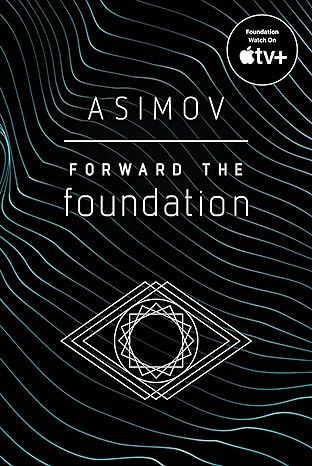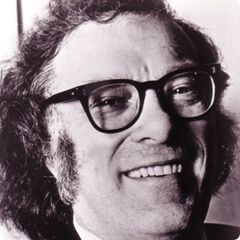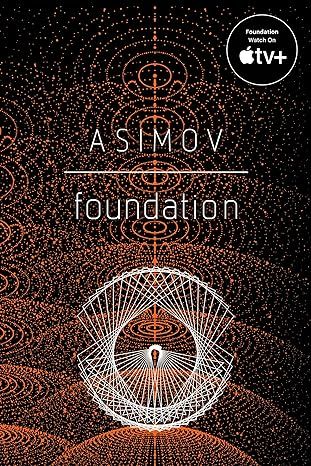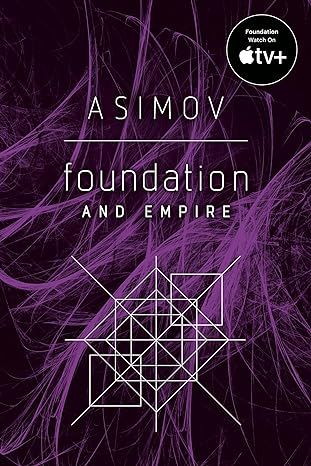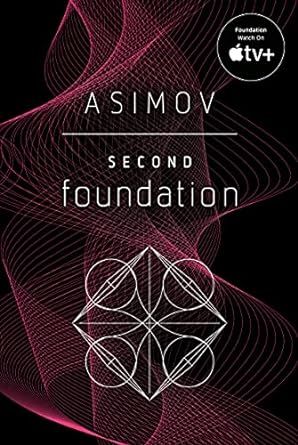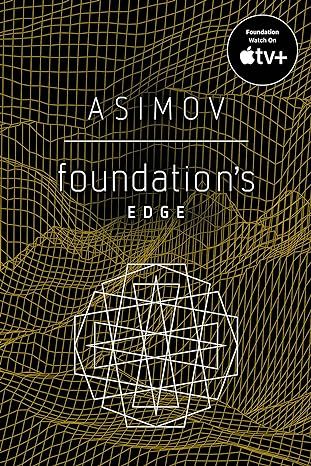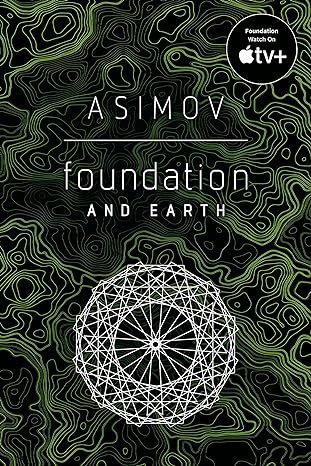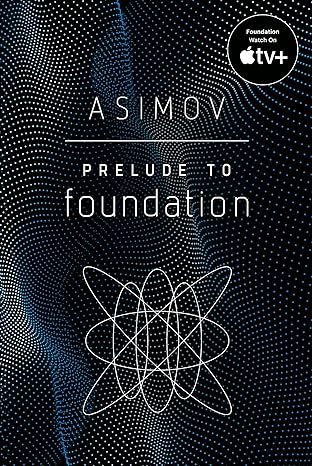Forward the FoundationKindle
4.6
-
4,287 ratings
The second of two prequel novels in Isaac Asimov’s classic science-fiction masterpiece, the Foundation series
THE EPIC SAGA THAT INSPIRED THE APPLE TV+ SERIES FOUNDATION
As Hari Seldon struggles to perfect his revolutionary theory of psychohistory and ensure a place for humanity among the stars, the great Galactic Empire totters on the brink of apocalyptic collapse. Caught in the maelstrom are Seldon and all he holds dear, pawns in the struggle for dominance. Whoever can control Seldon will control psychohistory—and with it the future of the Galaxy.
Among those seeking to turn psychohistory into the greatest weapon known to man are a populist political demagogue, the weak-willed Emperor Cleon I, and a ruthless militaristic general. In his last act of service to humankind, Hari Seldon must somehow save his life’s work from their grasp as he searches for its true heirs—a search that begins with his own granddaughter and the dream of a new Foundation.
Kindle
$8.99
Available instantly
Audiobook
$0.00
with membership trial
Hardcover
$2.25
Paperback
$10.99
Ships from
Amazon.com
Payment
Secure transaction
ISBN-10
0593160002
ISBN-13
978-0593160008
Print length
384 pages
Language
English
Publisher
Del Rey; Spectra; Reissue
Publication date
December 14, 2020
Dimensions
5.5 x 0.8 x 8.2 inches
Item weight
2.31 pounds
Frequently bought together
Popular highlights in this book
People tended to avoid the humiliation of failure by joining the obviously winning side even against their own opinions.
Highlighted by 550 Kindle readers
Being feared is nothing. Being despised, even, can be lived with. But being laughed at—that’s fatal.
Highlighted by 444 Kindle readers
A paradox arises only out of an ambiguity that deceives either unwittingly or by design.
Highlighted by 373 Kindle readers
Product details
ASIN :
B003EY7ICW
File size :
8255 KB
Text-to-speech :
Enabled
Screen reader :
Supported
Enhanced typesetting :
Enabled
X-Ray :
Enabled
Word wise :
Enabled
Sample
1
"I tell you again, Hari," said Yugo Amaryl, "that your friend Demerzel is in deep trouble." He emphasized the word "friend" very lightly and with an unmistakable air of distaste.
Hari Seldon detected the sour note and ignored it. He looked up from his tricomputer and said, "I tell you again, Yugo, that that's nonsense." And then--with a trace of annoyance, just a trace--he added, "Why are you taking up my time by insisting?"
"Because I think it's important." Amaryl sat down defiantly. It was a gesture that indicated he was not going to be moved easily. Here he was and here he would stay.
Eight years before, he had been a heatsinker in the Dahl Sector--as low on the social scale as it was possible to be. He had been lifted out of that position by Seldon, made into a mathematician and an intellectual--more than that, into a psychohistorian.
Never for one minute did he forget what he had been and who he was now and to whom he owed the change. That meant that if he had to speak harshly to Hari Seldon--for Seldon's own good--no consideration of respect and love for the older man and no regard for his own career would stop him. He owed such harshness--and much more--to Seldon.
"Look, Hari," he said, chopping at the air with his left hand, "for some reason that is beyond my understanding, you think highly of this Demerzel, but I don't. No one whose opinion I respect--except you--thinks well of him. I don't care what happens to him personally, Hari, but as long as I think you do, I have no choice but to bring this to your attention."
Seldon smiled, as much at the other's earnestness as at what he considered to be the uselessness of his concern. He was fond of Yugo Amaryl--more than fond. Yugo was one of the four people he had encountered during that short period of his life when he was in flight across the face of the planet Trantor--Eto Demerzel, Dors Venabili, Yugo Amaryl, and Raych--four, the likes of which he had not found since.
In a particular and, in each case, different way, these four were indispensable to him--Yugo Amaryl, because of his quick understanding of the principles of psychohistory and of his imaginative probings into new areas. It was comforting to know that if anything happened to Seldon himself before the mathematics of the field could be completely worked out--and how slowly it proceeded, and how mountainous the obstacles--there would at least remain one good mind that would continue the research.
He said, "I'm sorry, Yugo. I don't mean to be impatient with you or to reject out of hand whatever it is you are so anxious to make me understand. It's just this job of mine; it's this business of being a department head--"
Amaryl found it his turn to smile and he repressed a slight chuckle. "I'm sorry, Hari, and I shouldn't laugh, but you have no natural aptitude for the position."
"As well I know, but I'll have to learn. I have to seem to be doing something harmless and there is nothing--nothing--more harmless than being the head of the Mathematics Department at Streeling University. I can fill my day with unimportant tasks, so that no one need know or ask about the course of our psychohistorical research, but the trouble is, I do fill my day with unimportant tasks and I have insufficient time to--" His eyes glanced around his office at the material stored in computers to which only he and Amaryl had the key and which, even if anyone else stumbled upon them, had been carefully phrased in an invented symbology that no one else would understand.
Amaryl said, "Once you work your way further into your duties, you'll begin to delegate and then you'll have more time."
"I hope so," said Seldon dubiously. "But tell me, what is it about Eto Demerzel that is so important?"
"Simply that Eto Demerzel, our great Emperor's First Minister, is busily creating an insurrection."
Seldon frowned. "Why would he want to do that?"
"I didn't say he wants to. He's simply doing it--whether he knows it or not--and with considerable help from some of his political enemies. That's all right with me, you understand. I think that, under ideal conditions, it would be a good thing to have him out of the Palace, off Trantor . . . beyond the Empire, for that matter. But you think highly of him, as I've said, and so I'm warning you, because I suspect that you are not following the recent political course of events as closely as you should."
"There are more important things to do," said Seldon mildly.
"Like psychohistory. I agree. But how are we going to develop psychohistory with any hope of success if we remain ignorant of politics? I mean, present-day politics. Now--now--is the time when the present is turning into the future. We can't just study the past. We know what happened in the past. It's against the present and the near future that we can check our results."
"It seems to me," said Seldon, "that I have heard this argument before."
"And you'll hear it again. It doesn't seem to do me any good to explain this to you."
Seldon sighed, sat back in his chair, and regarded Amaryl with a smile. The younger man could be abrasive, but he took psychohistory seriously--and that repaid all.
Amaryl still had the mark of his early years as a heatsinker. He had the broad shoulders and the muscular build of one who had been used to hard physical labor. He had not allowed his body to turn flabby and that was a good thing, for it inspired Seldon to resist the impulse to spend all of his time at the desk as well. He did not have Amaryl's sheer physical strength, but he still had his own talents as a Twister--for all that he had just turned forty and could not keep it up forever. But for now, he would continue. Thanks to his daily workouts, his waist was still trim, his legs and arms firm.
He said, "This concern for Demerzel cannot be purely a matter of his being a friend of mine. You must have some other motive."
"There's no puzzle to that. As long as you're a friend of Demerzel, your position here at the University is secure and you can continue to work on psychohistorical research."
"There you are. So I do have a reason to be friends with him. It isn't beyond your understanding at all."
"You have an interest in cultivating him. That, I understand. But as for friendship--that, I don't understand. However--if Demerzel lost power, quite apart from the effect it might have on your position, then Cleon himself would be running the Empire and the rate of its decline would increase. Anarchy might then be upon us before we have worked out all the implications of psychohistory and made it possible for the science to save all humanity."
"I see. --But, you know, I honestly don't think that we're going to work out psychohistory in time to prevent the Fall of the Empire."
"Even if we could not prevent the Fall, we could cushion the effects, couldn't we?"
"Perhaps."
"There you are, then. The longer we have to work in peace, the greater the chance we will have to prevent the Fall or, at least, ameliorate the effects. Since that is the case, working backward, it may be necessary to save Demerzel, whether we--or, at least, I--like it or not."
"Yet you just said that you would like to see him out of the Palace and away from Trantor and beyond the Empire."
"Yes, under ideal conditions, I said. But we are not living under ideal conditions and we need our First Minister, even if he is an instrument of repression and despotism."
"I see. But why do you think the Empire is so close to dissolution that the loss of a First Minister will bring it about?"
"Psychohistory."
"Are you using it for predictions? We haven't even gotten the framework in place. What predictions can you make?"
"There's intuition, Hari."
"There's always been intuition. We want something more, don't we? We want a mathematical treatment that will give us probabilities of specific future developments under this condition or that. If intuition suffices to guide us, we don't need psychohistory at all."
"It's not necessarily a matter of one or the other, Hari. I'm talking about both: the combination, which may be better than either--at least until psychohistory is perfected."
"If ever," said Seldon. "But tell me, where does this danger to Demerzel arise? What is it that is likely to harm him or overthrow him? Are we talking about Demerzel's overthrow?"
"Yes," said Amaryl and a grim look settled on his face.
"Then tell me. Have pity on my ignorance."
Amaryl flushed. "You're being condescending, Hari. Surely you've heard of Jo-Jo Joranum."
"Certainly. He's a demagogue-- Wait, where's he from? Nishaya, right? A very unimportant world. Goat herding, I think. High-quality cheeses."
"That's it. Not just a demagogue, however. He commands a strong following and it's getting stronger. He aims, he says, for social justice and greater political involvement by the people."
"Yes," said Seldon. "I've heard that much. His slogan is: 'Government belongs to the people.' "
"Not quite, Hari. He says: 'Government is the people.' "
Seldon nodded. "Well, you know, I rather sympathize with the thought."
"So do I. I'm all for it--if Joranum meant it. But he doesn't, except as a stepping-stone. It's a path, not a goal. He wants to get rid of Demerzel. After that it will be easy to manipulate Cleon. Then Joranum will take the throne himself and he will be the people. You've told me yourself that there have been a number of episodes of this sort...
Read more
About the authors
Isaac Asimov
Isaac Asimov was an American author and professor of biochemistry at Boston University, best known for his works of science fiction and for his popular science books. Asimov was prolific and wrote or edited more than 500 books and an estimated 90,000 letters and postcards. His books have been published in 9 of the 10 major categories of the Dewey Decimal Classification.
Asimov wrote hard science fiction and, along with Robert A. Heinlein and Arthur C. Clarke, he was considered one of the "Big Three" science fiction writers during his lifetime. Asimov's most famous work is the Foundation Series; his other major series are the Galactic Empire series and the Robot series. The Galactic Empire novels are explicitly set in earlier history of the same fictional universe as the Foundation series. Later, beginning with Foundation's Edge, he linked this distant future to the Robot and Spacer stories, creating a unified "future history" for his stories much like those pioneered by Robert A. Heinlein and previously produced by Cordwainer Smith and Poul Anderson. He wrote hundreds of short stories, including the social science fiction "Nightfall", which in 1964 was voted by the Science Fiction Writers of America the best short science fiction story of all time. Asimov wrote the Lucky Starr series of juvenile science-fiction novels using the pen name Paul French.
Read more
Reviews
Customer reviews
4.6 out of 5
4,287 global ratings
Sayel Cortes
5
Skillfully recounting the life of Hari Seldon
Reviewed in the United States on May 23, 2024
Verified Purchase
Following the life of Hari Seldon, the fall of the empire and the beginning of the foundation develops. A story that takes place in one planet but defines the future of the empire crosses through decades of political challenges. Asimov skillfully takes us through all this being careful not to overwelm us in details, but carefully describing the line that guides the story
Read more
William S. Morris
5
Prophetic
Reviewed in the United States on October 15, 2023
Verified Purchase
This book, published in 1993, seems as if it is talking about modern history. The deterioration of Trantor sounds like what is happening in San Francisco in present times. As I am reading about Hari's manipulation of the tax code, I'm reading in the news about congress's desire to simplify the tax code. Clearly this book is before 23 and me. I thought it was a book by Asimov that I read about the genetic code, but Hari's problems with determining Wanda's genetic profile is amusing in light of today's ability to get a genetic profile within a week after spitting into a tube. Despite this problem, the story is fascinating. It's also sad as time marches on in the story.
Read more
Ron Carey
5
Cover matches my collection of the other six books
Reviewed in the United States on March 31, 2024
Verified Purchase
I liked the fact that this book matches and completes my Asimov set of the six other Foundation books. That is the reason why I purchased this one, and I am replacing my "trade paperbacks" with the larger "paperback" versions because the print is bigger. No issues with the quality whatsoever, and the price is right.
Top Isaac Asimov titles
View allBest sellers
View all
The Tuscan Child
4.2
-
100,022
$8.39

The Thursday Murder Club: A Novel (A Thursday Murder Club Mystery)
4.3
-
155,575
$6.33

Sapiens: A Brief History of Humankind
4.6
-
140,302
$13.49

The Butterfly Garden (The Collector, 1)
4.3
-
88,556
$9.59

Things We Hide from the Light (Knockemout Series, 2)
4.4
-
94,890
$11.66

The Last Thing He Told Me: A Novel
4.3
-
154,085
$2.99

The Perfect Marriage: A Completely Gripping Psychological Suspense
4.3
-
143,196
$9.47

The Coworker
4.1
-
80,003
$13.48

First Lie Wins: A Novel (Random House Large Print)
4.3
-
54,062
$14.99

Mile High (Windy City Series Book 1)
4.4
-
59,745
$16.19

Layla
4.2
-
107,613
$8.99

The Locked Door
4.4
-
94,673
$8.53
